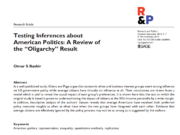Randall v. Sorrell and Wisconsin Right to Life v. FEC brought before the Supreme Court a variety of campaign finance regulations, from contribution limits and expenditure limits to restrictions on incorporated entities. Despite expressions of discomfort by many Justices with the way modern campaign finance is regulated, the Court declined to rework Buckley v. Valeo‘s landmark 1976 holding to relieve that discomfort. Nor did it sanction a more lenient constitutional test to satisfy those other Justices who would prefer to give legislatures and Congress leeway to regulate politics. The Court had the opportunity to revisit Buckley and did not. Has Buckley now become unassailable – what some might call a superprecedent?
In this essay, election law attorney Allison Hayward argues that, even were one to grant the existence of a class of decisions that are superprecedents, Buckley v. Valeo is a poor candidate for that classification. Her essay first reviews the Randall and Wisconsin decisions and assesses how they use the Court’s campaign finance precedents. It then discusses what might be meant by superprecedent and how a superprecedent might be identified. Then, looking at Buckley‘s history, analysis and application, the essay discusses whether Buckley should be classified as a superprecedent, and answers that question in the negative. Finally, Hayward revisits what Buckley-type thinking has done to campaign finance regulation, and makes some preliminary suggestions for how, if the opportunity presents itself again, the Court might rework its analysis.














